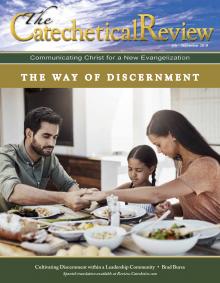In 2005, the United States Conference of Catholic Bishops published The National Directory for Catechesis, which states, “each person with a disability has catechetical needs that the Christian community must recognize and meet. All baptized persons with disabilities have a right to adequate catechesis and deserve the means to develop a relationship with God.”[1] My interest and involvement in the religious formation of children with disabilities has its roots in personal experience. As I searched for answers about what was best for our family, I found that our story was common; and though some students are being catechized at home, students absent from their parish faith formation programs are missing a fundamental element of the Christian faith: community.
Where are the Children with Disabilities?
Like most parents, I never imagined my child would need special education. My husband and I had a dream and a goal to educate our children in Catholic schools for grades K-12. When our fifth child, Grace, entered kindergarten that dream began to crumble. I knew, from her first day, Grace would need extra help staying seated, lining up, and waiting her turn. What I didn’t realize was that her lack of eye contact, inability to remember the names of extended family, and obsession with dinosaurs were indicators of an Autism Spectrum Disorder, a diagnosis we would not receive until the summer after her kindergarten year. Gracie’s deficits in communication skills were seen as disrespect, her lack of social skills as unkindness towards classmates, and her sensory sensitivities as immature, even wild behavior. My husband and I made the decision then to let go of our dream, and Grace joined the 13 percent of students who receive special education services in public school.[2] We knew that we needed to provide our child with her faith formation; we chose to home school in the beginning. For three years we taught Grace and prepared her for First Reconciliation and First Communion using our parish faith formation program materials.
Public school students comprise the majority of the children who attend Catholic faith formation programs. If 13% of children in public school receive special education services, it would be fair to assume that 13 % (1 in every 8) of the students in faith formation programs require some kind of educational support to optimize their learning outcomes. John Paul II defined the optimal learning outcome for religious education: “The definitive aim of catechesis is to put people not only in touch, but also in communion and intimacy, with Jesus Christ…”[3] In the Catholic tradition, this also includes the preparation and reception of the Sacraments of Reconciliation, Eucharist, and Confirmation.
The numbers of students with disabilities in our faith formation programs do not match the statistics. Parents may be withholding information about their children’s needs or not enrolling them at all. The reasons for this vary. Parents of children with disabilities often have many additional obligations in the care of their children. There are medical appointments, therapy appointments, and additional meetings each school year with teachers and support staff at the child’s school. Some parents may just be at the limit of what they can manage. Some families may have already experienced rejection from their faith community and believe that their parish faith formation program cannot or will not accommodate their child’s needs.[4] Children with disabilities must be included in Catholic faith formation programs. Getting them there is a matter of creating inclusive Christian communities that will welcome children with disabilities and their families.
The rest of this online article is available for current Guild members.
This article is from The Catechetical Review (Online Edition ISSN 2379-6324) and may be copied for catechetical purposes only. It may not be reprinted in another published work without the permission of The Catechetical Review by contacting [email protected]

















